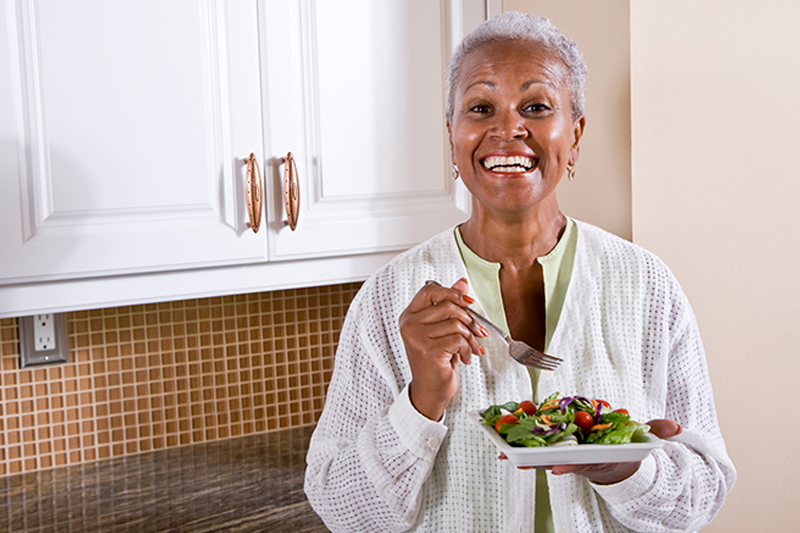
Proper nutrition for the elderly is important for overall health.
Remember family dinners at Grandma’s house? The tantalizing scents wafting out from the kitchen would draw everyone in to assemble at the table to enjoy her home cooking. There were always lots of leftovers for future meals or late-night snacks.
Yet for a number of seniors, these types of family meals are few and far between. The day-to-day reality is that there are frequently a number of obstacles to good nutrition for the elderly, such as:
- Not wanting to bother with preparing a nutritious meal for just one or two people
- Health issues that make it hard to tend to the tasks of grocery shopping and cooking
- Medication side effects that impact appetite or how food tastes
- Loss of smell and/or taste
Overcoming the Hurdles to Good Nutrition for the Elderly
For seniors facing the difficulties above, or any others, these guidelines can help.
- If loneliness during mealtime is a problem, seniors can network with friends for potluck dinners, trying out new recipes together, or going out for meals. Other options include congregate meals at senior centers, Meals On Wheels, or a companion from Home With You Senior Care.
- Grocery shopping and preparing meals may be taxing. There are a number of companies that now offer healthy and balanced, ready-made meals delivered straight to your door. Grocery delivery service or curbside pickup can also be great for seniors. A caregiver from Home With You Senior Care is also available to pick up groceries, prepare meals, and clean up the kitchen afterwards.
- Lack of taste or smell might make foods unappealing, but adding herbs and spices to recipes will help. Be sure to limit salt, however. Try bright-colored vegetables and fruit in differing textures for textural and visual appeal.
- Review medications with the prescribing doctor to determine if there are alternative treatment options that will not impact the older adult’s appetite.
Easy Steps to Better Nutrition for the Elderly
These guidelines may help make sure older adults are on the right course to a healthier diet.
- Select foods that are typically loaded with nutrients but lower in calories, such as vegetables and fruit, whole grains, lean meats and seafood, beans, seeds, nuts, and low-fat or fat-free dairy products.
- Skip (or at least limit) the amount of empty calorie foods, such as cookies and other baked goods, chips, candy, soda, and alcohol.
- Stay hydrated. Many older adults lose the feeling of thirst as they age, so it’s essential to drink sufficient water through the day, whether thirsty or not.
- Physical activity often helps increase appetite. Talk with the physician for an ideal exercise program.
For additional helpful resources pertaining to maximizing senior nutrition, as well as hands-on help with eliminating the challenges being faced, contact Home With You Senior Care at 410-756-0959 to learn more about our award-winning hourly and live in care in Hampstead, Maryland and other nearby areas.
